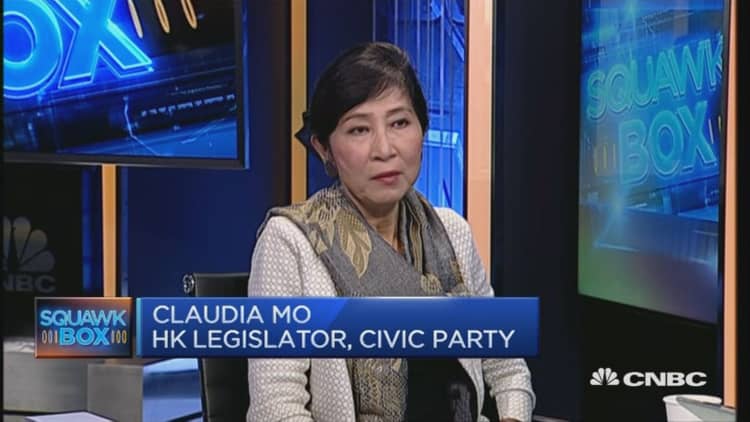Political uncertainty has gripped most of Asia, marking new areas of global concern even as attention is fixed on measures proposed by U.S. President-elect Donald Trump.
The domestic events unfolding across the region—from the potential exit of South Korea's president to fresh protests in Indonesia and Malaysia—are now at boiling point following weeks of steady simmering.
In addition to hurting long-term political stability, the unrest could also spell trouble for the region's economic outlook, which is already looking shaky amid a potential radical twist in U.S. foreign and trade policy, thanks to Trump's shock election victory.
Here's a breakdown of the tumult and its implications in each country.
South Korea
In the latest chapter of President Park Geun-hye's corruption scandal, the nation's two major opposition parties announced on Monday that they will begin amassing signatures to remove the president from office and review procedures for the impeachment process.
For nearly a month now, President Park has been under pressure for allowing a close friend, Choi Soon-Sil, to interfere in state affairs. Choi, 60, is also accused of embezzlement, forcing conglomerates to make massive donations to nonprofits, and getting preferential treatment from banks for loans.
Monday's impeachment news comes a day after local prosecutors said the president acted as a criminal accomplice in Choi's extortion.
Massive protests have gripped the country and despite Park's attempts at mitigating the crisis, including a cabinet reshuffle, she may have no other choice except to quit. "There's a 70 percent probability the president will resign, with Prime Minister Hwang Kyo-ahn assuming her duties until a new president is chosen in an election held within 60 days of Park's resignation," according to Eurasia.
But whether she quits or is impeached, strategists widely believe the crisis will create a political power vacuum and potentially paralyze the government for months to come.
Malaysia
Tens of thousands took to the streets of Kuala Lumpur on Saturday to demand the resignation of Prime Minister Najib Razak over his alleged involvement in a grand corruption case, resulting in a fresh clampdown on anti-government critics. Led by Bersih, a coalition of non-governmental organisations, it was the fifth mass protest since 2007.
At least 15 activists and members of the political opposition were arrested, drawing criticism from human rights groups who say the arrests were a silencing measure on Najib's part and impinged on the freedom of peaceful assembly.

But Najib won't resign anytime soon, Oh Ei Sun, Najib's former political secretary from 2009-2011 and current senior fellow at Singapore's Nanyang Technological University, told CNBC on Monday. The country's ruling party, the United Malays National Organisation (UMNO), has been in power since 1963 so it will be difficult to dislodge Najib as long he retains UMNO's support, Oh explained.
Indonesia
Southeast Asia's largest economy also witnessed a massive rally over the weekend as citizens called for national unity amid deepening religious divisions.
An investigation focusing on Jakarta Governor Basuki "Ahok" Tjahaja Purnama is underway after the 50-year old Christian cited a Koranic verse during a Sept. 27 speech. The verse suggests Muslims should not take Jews or Christian as their allies or leaders and in his remarks, Ahok said Indonesians should not be deceived by opponents who use the verse to influence the election.
Blasphemy is a criminal offense in Indonesia and conservative Muslims demanded for Ahok's arrest during a massive riot earlier this month, in which dozens were injured and one person was killed.
"Ahok assumed his current position when former governor Joko Widodo was elected president. And while the two have been political allies in the past, the blasphemy investigation may strain ties between them and project an image of Indonesia as a nation of religious intolerance," the Council of Foreign Relations (CFR) said in a recent note.
Myanmar
The country's western Rakhine state, home to 1.1 million people who identify themselves as Rohingya Muslims, has witnessed mounting brutality since coming under security lockdown in early October.
Following attacks on three police border posts, which the government believes was the work of a jihadist organization, military troops armed with attack helicopters were sent into the region last month.
"Over 130 people have died and 234 have been arrested in the heaviest wave of violence in the region since 2012," according to the CFR, who noted the additional issues of scarce food, rape and looting by soldiers.
The United Nations (UN) has criticized the lockdown and urged the government, led by de facto leader Aung San Suu Kyi, to allow aid organizations into the area and conduct investigations into military abuse. Last week, former UN chief Kofi Annan warned that the recent violence was "plunging the state into renewed instability and creating new displacement."
Hong Kong
Beijing's historic interference in a domestic Hong Kong legal case has sparked renewed trouble in the special administrative territory (SAR).
Chinese President Xi Jinping urged Hong Kong Chief Executive Leung Chun-ying to "uphold national unity and maintain social and political stability" on Monday after a Beijing court banned two elected Hong Kong lawmakers from taking office earlier this month.
Sixtus Leung and Yau Wai-ching—who insulted the mainland during their oath ceremonies—filed to appeal the ruling last week, which was criticized for undermining the city's judiciary.
Under the "One Country, Two Systems" formula, Hong Kong enjoys high levels of autonomy from China, but the recent ruling sparked fears of growing Chinese encroachment and pressure on pro-democracy advocates.

Thailand
King Bhumibol Adulyadej's death in October has resurfaced concerns about the country's return to democracy two years following a military coup.
"Although the king's formal political role in Thailand is highly limited, he was nevertheless a person of great moral authority who was able to calm many conflicts. His son is widely perceived to neither have anything like the moral authority nor the depth of affection from his subjects," explained Société Générale in a recent note, adding that it remains difficult to judge how the royal succession will complicate Thai politics.
In the meantime however, the country is in official mourning period until late 2017 and the military junta is widely expected to continue to consolidating power and push back elections to 2018.

